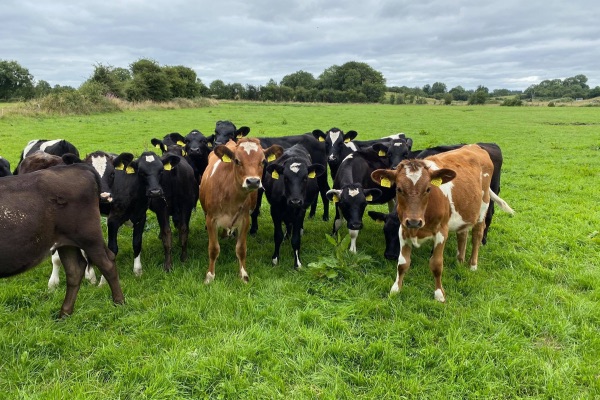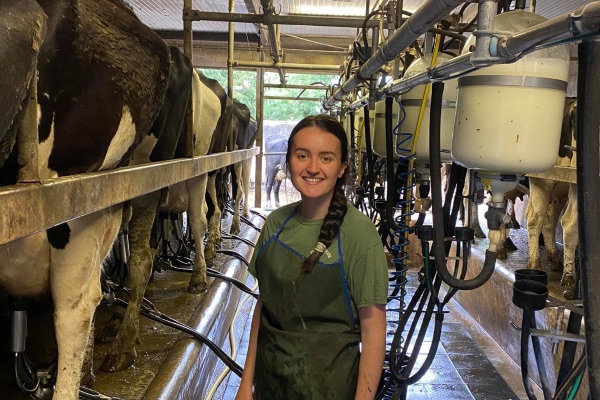In this week’s Student Focus segment, That’s Farming, speaks to Penny Gavin, an animal and crop production graduate and a current Walsh Scholar, researching farmer and advisor engagement with health and safety.
The Mullingar, Co Westmeath native hails from a fifth-generation family farm.
“It was a beef and sheep farm until 1979 when my father and grandfather converted to dairy farming,” she told That’s Farming.
“My earliest memory of being on the farm is when I was about three. My mum bought me a pair of little yellow wellies, and I used to run along beside my dad to try to keep up with him when he was herding.”
Lakeview Farm
On the shores of Lough Ennell, the farm is operated by her father, Paddy Gavin, with help from a relief milker, local contractors, and family members.
The spring-calving dairy herd comprises 120 cows. In the past five years, they increased their herd size from 100 cows to 120.
“Milk price and better grassland management influenced this decision as we were not very heavily stocked,” the 23-year-old told That’s Farming.
They farm Friesian and Jersey-cross cows across the 250-acre enterprise.
“We use an Angus bull to clean up after AI. We use these breeds for their fertility, for their ease of management, and their milk solids.”
“Furthermore, we do three rounds of AI and clean up with our stock bulls. My dad carries out the AI himself. We finish all breeding by July 15th to ensure a compact calving season.”

Calving, ideal cow type and grassland management
Calving starts at the end of January with the aim to be finished by the middle of April.
“It takes place in spring to coincide with the spring grass grown to maximise the grazing season.”
“My ideal cow would be about 500-550kgs with good fertility and milk solids.”
The family keeps dairy heifers as replacements or sells them as springers, whilst they sell all male progeny at 2-3-weeks-old.
“We rear our own replacements. These calve down at 24-months-old.”
“The herd averages about 5,800 litres. The solids are at about 480kgs. Butterfat is about 4.3%, and protein is about 3.6%. Our 6-week calving rate is 92%, and the herd’s calving interval is 361 days. “
Grassland management is paramount on Lakeview farm. “We grass measure and budget regularly. We have a paddock system in place.”
They have a senior herringbone parlour with ten units. “Cows are milked twice per day, and milking takes about two-and-a-half hours.”
“We are planning to upgrade this year. We are putting in a new parlour, a 20-unit herringbone, and a new cubicle shed.”
Currently, they have 100 cubicles, a slatted house to carry 80 adult cattle, a calving shed, and two calf sheds to accommodate 100 calves.
Animal husbandry and family bonding
The most enjoyable aspect of farming for the Macra na Feirme and Agricultural Science Association member is; being outdoors and working with animals.
“I mostly help around calving time, doing the night shifts, feeding and looking after calves. Also, I help with milking.”
“It is a great opportunity to spend time with my dad and help him when I can. The long hours and late nights’ calving can be hard, but also rewarding when you see the lovely replacement heifers coming back into the parlour at two years of age.”
“I am most passionate about animal husbandry. I find it very rewarding seeing the animals doing so well and improving over time.”

ACP at UCD
Penny commenced her undergraduate studies in 2016 immediately after completing her Leaving Certificate.
Agricultural science in UCD was her first choice on the CAO as the agricultural sector provides a “wide range of opportunities for a graduate student”.
She graduated in 2020, specialising in Animal and Crop Production (ACP).
“UCD has a brilliant reputation for agricultural sciences globally. I knew people that completed the Animal and Crop Production course there, and they enjoyed it.”
Placement on five enterprisese
Specialising in Animal and Crop Production required Penny to undertake placements on five different enterprises; beef, sheep, pigs, tillage, and dairy.
“I did five weeks on a pig farm in Co. Westmeath; eight weeks on a dairy in Co. Offaly and five weeks on an organic sheep farm in Co. Wicklow. Furthemore, I spent five weeks on a pedigree Angus farm in Co. Westmeath before finishing up with eight weeks on a beef, sheep and tillage farm in Co. Offaly.”
“I thoroughly enjoyed all of these placements and gained so much experience in each of these sectors before my final year in college.”
“As our home farm is a family farm, it was great to work with larger teams and to experience the different dynamics.”
In her third year of college, Penny studied abroad for a semester at Purdue University in Indiana, America, from August to December. She was awarded a student exchange scholarship.
“It was fantastic to see agriculture in a different country. It gave me an appreciation for the grass-based system we have here in Ireland.”
Penny revealed that the best part of this course was the different experiences she gained, such as study abroad and work placements, but most of all, the friends she made along the way.
“My undergraduate experience exceeded my expectations. I enjoyed all aspects of the course from lectures, lab work, practical days, site visits to class nights out.”

Walsh Scholar
Penny is currently undertaking a research masters with the Health and Safety Authority and Teagasc as a Walsh scholar, researching farmer and advisor engagement with health and safety.
“I never planned to do a masters straight after my undergraduate. Instead, I planned to go to New Zealand for the year and work on a farm over there and do a masters when I came back, but due to the pandemic, this was no longer possible.”
“Then, I decided that this would be the perfect time to further my education, so I applied for the masters with Teagasc. I am very glad now that I did. I am doing this masters as part of the Walsh Scholarship Programme.”
“So far, I am thoroughly enjoying this masters. It combines your research study with a placement in a Teagasc office. You get the best of both worlds – advisory experience and a research study – combined,” the Walsh Scholar added.
Travel and career
Penny feels that there are “many opportunities in the agricultural sector”.
“I have not decided what route I would like to take yet. However, I am excited to see what roles will be available when I finish my masters next year.”
“I would love to travel. It is not ideal at the moment with the pandemic and restrictions, but I hope in the future to travel more.”
“I think if I wanted to work abroad for a while, there are always opportunities in the agricultural sector.”

Reflection
“Coming from a dairy farm, I enjoyed learning more about the aspects of farming in the other enterprises.”
“From the degree that I did, I got to experience each of the different enterprises and have an appreciation for the work that each role entails.”
“I got to travel abroad to experience agriculture in the United States and meet a wide range of people. Honestly, I have been fortunate to have gained these experiences as part of my four years in UCD.”
“I think that the outlook is good, but the agricultural sector will become much more environmentally focused. There will have to be adjustments made to facilitate this,” Penny concluded.
Further information
Are you an ACP graduate or Walsh Scholar? If you want to share your story, e-mail: [email protected]





